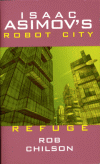This review will most likely contain spoilers for any previous books in the series, read at your own risk.
After a close call with Dr. Avery, the crazed mastermind of Robot City, finally returned to check on its progress. He captured Derec and Ariel, but eventually they escaped with the help of Mandelbrot and Wolruf. Derec, Ariel, Mandelbrot, and Wolruf escape by stealing Dr. Avery’s ship. Unfortunately the ship had no star charts in the computer, so they were unable to jump to safety. Ariel’s health had been deteriorating considerably, and eventually Mandelbrot demanded that something must be done. Derec and Ariel use a Key to Perihelion that was found in the ship in hopes it takes them to a place that might have a cure for her disease and possibly Derec’s amnesia.
This book mainly covers Derec and Ariel’s adventures on Earth, the destination the Key takes them to. They search out for a cure for Ariel and what possible interest Dr. Avery might have in Earth. We see here the claustrophobia Derec and Arial experience. This is a fitting contrast to Lije Baley’s agoraphobia which Asimov described in The Naked Sun and The Robots of Dawn.



This story brought me back to the Caves of Steel, as Derec and Ariel spend most of the book stranded on Earth. Ariel’s mysterious illness is at last revealed, and the Earth doctor’s surprise everyone. Derec and Ariel’s relationship is further developed, but I was hoping to find out more about Derec’s past and how she knew him. Derec’s twin is referenced, but I am still extremely curious about what that was all about. Is Derec some kind of robot or cyborg model? Was he copied? I am hoping that the last book ties up these loose ends.
Don’t worry, the last book answers a lot of your questions.